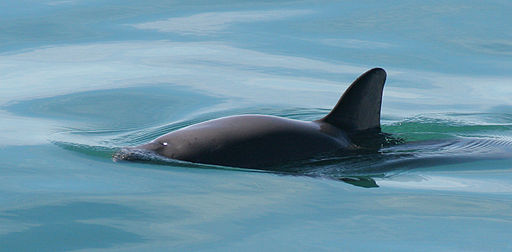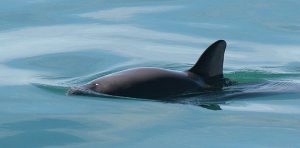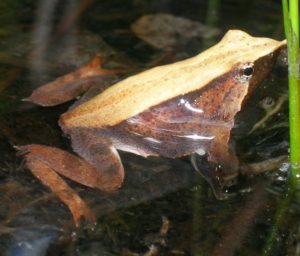Endangered Vaquita Still Genetically Healthy
The vaquita is the world’s rarest marine mammal. Gillnet fisheries have caused them to become entangled in the nets, and has resulted in their numbers dropping to fewer than 20 individuals. However, there is still hope as one new study has proven that they exhibit few signs of inbreeding or other problems of small populations.
 Image: By Paula Olson, NOAA [Public domain], via Wikimedia Commons
Image: By Paula Olson, NOAA [Public domain], via Wikimedia Commons The critically endangered vaquita (literally “little cow”, a species of porpoise endemic to the northern end of the Gulf of California) has survived in low numbers in its native Gulf of California for hundreds of thousands of years, a new genetic analysis has found. The study found little sign of inbreeding or other risks often associated with small populations.
Gillnet fisheries have entangled and killed many vaquitas in recent years and scientists believe that fewer than 20 of the small porpoises survive today. The new analysis demonstrates that the species’ small numbers do not doom it to extinction, however. Vaquitas have long survived and even thrived without falling into an “extinction vortex,” the new study showed. That’s a scenario in which their limited genetic diversity makes it impossible to recover.
The study was published in Molecular Ecology Resources. It’s lead author, Phil Morin, research geneticist at NOAA Fisheries’ Southwest Fisheries Science Centre, said: “The species, even now, is probably perfectly capable of surviving. We can now see that genetic factors are not its downfall. There’s a very good chance it could recover fully if we can get the nets out of the water.”
An increasing number of species in addition to the vaquita have maintained small but stable populations for long periods without suffering from inbreeding depression. Other species include the narwhal, mountain gorilla, and native foxes in California’s Channel Islands. Long periods of small population sizes may have given them time to purge harmful mutations that might otherwise jeopardize the health of their populations.
“It’s appearing to be more common than we thought that species can do just fine at low numbers over long periods,” said Morin, who credited the vaquita findings to genetic experts around the world who contributed to the research.
The idea that vaquitas could sustain themselves in low numbers is not new. Some scientists suspected that more than 20 years ago. Now advanced genetic tools that have emerged with the rapidly increasing power of new computer technology helped them prove the point.
“They’ve survived like this for at least 250,000 years. Knowing that gives us a lot more confidence that, in the immediate future, genetic issues are the least of our concerns,” said Barbara Taylor, research scientist at the Southwest Fisheries Science Centre.
The new analysis examined living tissue from a vaquita captured as part of a last-ditch international 2017 effort to save the fast-disappearing species. The female vaquita tragically died, but its living cells revealed the most complete and high-quality genome sequence of any dolphin, porpoise, or whale to date, generated in collaboration with the Vertebrate Genomes Project. Only in recent years have advances in sequencing technologies and high-powered computers made such detailed reconstruction possible.
While the vaquita genome is not diverse, the animals are healthy. The most recent field effort in fall 2019 spotted about nine individuals, including three calves, within their core habitat. The robust calves suggest that inbreeding depression is not harming the health of these last vaquita.
“These examples and others indicate that, contrary to the paradigm of an ‘extinction vortex’ that may doom species with low diversity, some species have persisted with low genomic diversity and small population size,” scientists wrote in the new study.
The genetic data suggest that the vaquita’s isolated habitat in the far northern Gulf of California has sustained roughly 5,000 vaquitas for around 250,000 years. The advent of gillnetting for fish and shrimp only a few decades ago drove vaquitas towards extinction, as they are incidentally caught in the nets.
More recently, Illegal gillnetting for totoaba, a fish about the same size and found in the same habitat as the vaquita, has compounded the losses. Totoaba were overfished by the mid-1970s and were listed as endangered by Mexico in 1975, and by the US in 1979. Today, international trade in totoaba is banned under CITES, a global agreement among governments to regulate or ban international trade in species under threat, but high demand from China for its swim bladder has led to a boom in illegal totoaba fishing in the past few years.
Demand for totoaba swim bladders has been driven by the belief in Chinese medicine that they are a cure to a variety of illness and diseases. Thousands of swim bladders are dried and smuggled out of Mexico, often through the United States. Fishermen receive around $4,000 for each pound of totoaba swim bladder, equivalent to half a year’s income from legal fishing activities. The practice has caused a catastrophic decline that is estimated as cutting the remaining vaquita population in half each year. The little porpoise wasn’t discovered until 1958, but is now the world’s rarest marine mammal.
However, this study proves that all may not be lost. “Small numbers do not necessarily mean the end of a species, if they have the protection they need,” Taylor said. “In conservation biology, we’re always looking for risk. We shouldn’t be so pessimistic. The sight of those three healthy calves in the water with their survivor mothers should inspire the protection they need to truly recover.”




No comments yet.